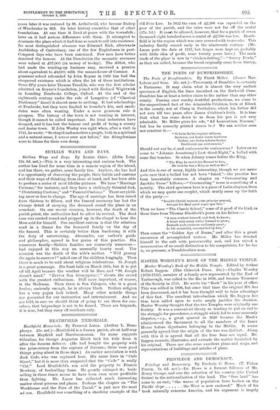SICILIAN WAYS AND DAYS.
Sicilian Ways and Days. By Louise Caico. (John Long. 12s. 6d. net.)—This is a very interesting and curious book. The author has lived for some time in a remote region of the island, and has there, we gather, some family ties. Anyhow, she has had Vie opportunity of observing the people, their habits and customs and their ways of thinking, from close at hand, and has been able to produce a series of most lifelike pictures. We have " Marriage Customs," for instance, and they have a strikingly Oriental look, " Christening Customs," and " Funeral Customs." These are yield- ing more or less to change. The age of marriage has been raised from thirteen to fifteen, and the funeral ceremony has lost the strange detail of carrying the deceased round the place in an armchair. On one recent occasion, however, the death of the parish priest, the authorities had to allow its revival. The dead man was carried round and propped up in the chapel to bear the Mass said for himself. One excellent custom is that the relatives send in a dinner for the bereaved family on the day of the funeral. This is certainly better than burdening it with the duty of entertaining. Alessandro, our author's guide and philosopher, agreed in her praise of this practice. His numerous family—Sicilian families are commonly numerous— had enjoyed in this way an unusually hearty meal. The occasion was the death of the wife's mother. " Will granny die again to-morrow?" asked one of the children longingly. Then there is much to be said about religious celebrations. St. Joseph is a great personage. His feast falls on March 19th, but it is put off till April because the weather will be finer, and " St. Joseph doesn't mind." "Evviva San Giuseppuzzo !" shouts the crowd with the greatest enthusiasm. Still more important, of course, is the Madonna. Then there is San Calogero, who is a great healer; curiously enough, he is always black. Sicilian religion has a very pagan look indeed. Many other notable things are presented for our instruction and entertainment. And we are told, in case we should think of going to see them for our- selves, that brigandage is not to be feared. There are brigands, it is true, but they carry off residents only.


























































 Previous page
Previous page